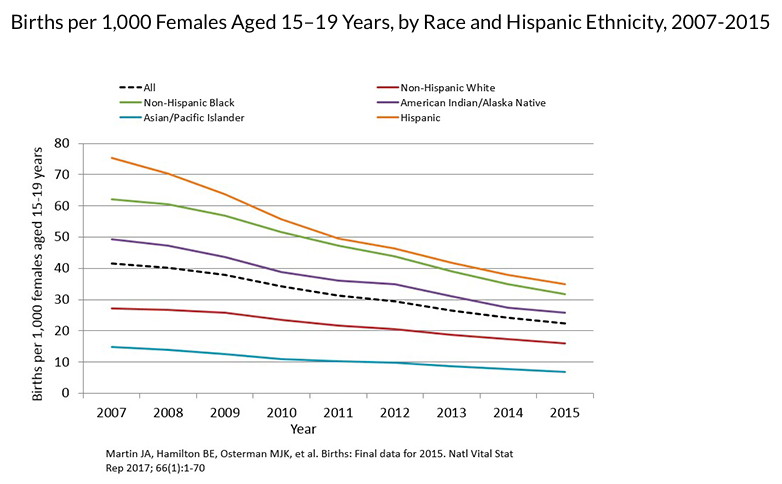Defunding Teen Pregnancy Prevention Programs Could Undo Decades of Public Health Progress

The United States has one of the highest rates (at 21.15 births per 1000 women ages 15-19) of teen pregnancies and births in the developed world. We’ve made a lot of progress in the past two decades, during which our rates of teen births dropped by 60 percent reaching their lowest point ever, but there is still much more work to be done – especially considering the significant disparities that exist by race and region, and the life-long impacts a pregnancy can have on a teenager.
 Today, we face a new barrier to progress. Recent actions by the federal government will limit the very evidence-based programs that have contributed to our success so far, quite possibly reversing this trend of fewer unwanted teen pregnancies, abortions and births.
Today, we face a new barrier to progress. Recent actions by the federal government will limit the very evidence-based programs that have contributed to our success so far, quite possibly reversing this trend of fewer unwanted teen pregnancies, abortions and births.
Over the summer, the administration defunded the Teen Pregnancy Prevention (TPP) program, a national effort launched in 2010 to reduce teen pregnancies by developing and disseminating programs that are proven to work. This decision came as a shock to the 84 grantees across the country tasked with identifying effective, innovative approaches to reduce teen pregnancy, particularly in populations with the greatest need. This included four Pennsylvania programs:
- “The Choice is Yours,” a seven-session program to reduce unintended pregnancies and sexually transmitted infections in young women ages 14-19 from communities with high rates of teen births.
- “Promoting Awareness through Live Movement and Sound,” a theater-based, group-level intervention for African American young men ages 15-22 to strengthen protective factors that are associated with improved sexual decision-making and reduce likelihood of teen or unplanned pregnancy.
- “Promoting Awareness through Live Movement and Sound” for Youth with Autism Spectrum Disorder (ASD), a program that uses interactive theater lessons, tailored messages, and role-playing exercises to prevent teen pregnancy and sexually transmitted infections among teens with ASD.
- “Testing an Adolescent-Centered Model of Contraceptive Care to Reduce Contraceptive Discontinuation,” a quality improvement initiative designed to revolutionize how pediatric hospitals provide sexual and reproductive health services to teens by using health coaches to promote contraceptive continuation, best practice alerts to ensure that teens prescribed teratogenic medications receive contraceptive counseling, and online social support tools to answer questions that parents and teens may have about sexual and reproductive health issues.
The policymakers who chose to defund TPP did so in the name of providing greater support for abstinence-only education, but this decision runs contrary to the evidence. In fact, abstinence-only programs do not lower the age of sexual initiation, do not reduce the occurrence of sexual encounters among teens, and do not lower rates of teen pregnancies, births or abortions, thereby not contributing to our national public health goals. Furthermore, some studies - including a 2004 congressional report - have found that many abstinence-based programs lack medically accurate information and actually increase sexual risk-taking behaviors among adolescents.
Comprehensive sexual education programs, on the other hand, are proven to reduce teen pregnancies. These programs provide information about the benefits of abstinence, and also give teens the information and skills they need to avoid sexual activity, negotiate condom and contraceptive use if they need it, and promote healthy romantic relationships.
How might this policy change affect Pennsylvania teens?
While Pennsylvania’s overall teen pregnancy and birth rates are lower than the national average, rates for the state’s Hispanic and black teens are much higher. Additionally, there are pockets – including Philadelphia, Pittsburgh and a number of rural counties – where these rates far outpace the national average. In fact, Philadelphia’s birth rate among teens ages 15-19 ranks fourth among the largest cities in the country. Only cities in Texas rank higher – where reproductive health rights and contraceptive access for women have been systematically rolled back over the past few decades.
Given these statistics, there are several reasons why TPP programs like the ones we described above were an important asset for Pennsylvania. First, the state does not mandate sex education. When information is provided, the state does not require that it be medically accurate, but does require the promotion of abstinence. Second, Pennsylvania does not have a substantial school-based health center infrastructure to fill in adolescents’ knowledge gaps. And finally, despite the mounting evidence that abstinence-only approaches are not effective and potentially even harmful, our state legislature has not moved to change its outdated approach to preparing young people to make healthy decisions. The combination of these factors will exacerbate the likely negative impacts of this new policy change.
Looking to the future of reproductive health programs
Defunding the federal TPP programs removes an important component of public health efforts to reduce unintended pregnancies. The impact of defunding the TPP programs in a state like Pennsylvania will be unevenly distributed, causing the greatest harm in communities already suffering from disparate access to comprehensive health care, safe housing, affordable day care and good schools. Ultimately, this federal funding decision will hurt the youth who stand to lose the most in both the short- and long-term.
